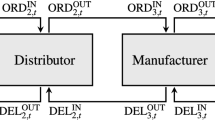Abstract
Inventory situations, introduced in Meca et al. (Eur J Oper Res 156: 127–139, 2004), study how a collective of firms can minimize its joint inventory cost by means of co-operation. Depending on the information revealed by the individual firms, they analyze two related cooperative TU games: inventory cost games and holding cost games, and focus on proportional division mechanisms to share the joint cost. In this paper we introduce a new class of inventory games: generalized holding cost games, which extends the class of holding cost games. It turns out that generalized holding cost games are totally balanced.We then focus on the study of a core-allocation family which is called N-rational solution family.It is proved that a particular relation of inclusion exists between the former and the core. In addition, an N-rational solution called minimum square proportional ruleis studied.
Similar content being viewed by others
References
Anupindi R, Bassok Y, Zemel E (1991) A general framework for the study of decentralized distribution systems. Manuf Serv Oper Manage 3:349–368
Bondareva ON (1963) Some applications of linear programming methods to the theory of cooperative games (in Russian). Probl Kibernety 10:119–139
Borm PEM, Hamers H, Hendrickx R (2001) Operations research games: a survey. TOP 9:139–216
Curiel I (1997) Cooperative game theory and applications. Kluwer, Dordrecht
Dantzig G (1991) The story about how it began: some legends, a little about its historical significance and comments about where its many mathematical programming extensions may be headed. In: Lenstra J (ed) A history of mathematical programming. North-Holland, Amsterdam, pp 19–26
Driessen THS, Tijs SH (1985) The τ-value, the core and semiconvex games. Int J Game Theory 14:229–248
Fleming W (1961) The convergence problem for differential games. J Math Anal Appl 3:102–116
Granot DG, Huberman G (1982) The relation between convex games and minimal cost spanning tree games: a case for permutationally convex games. SIAM J Algebr Discrete Methods 3:288–292
Hartman B, Dror M, Shaked M (2000) Cores of inventory centralization games. Games Econ Behav 31:26–49
Lemke CE, Howson JT Jr (1964) Equilibrium points of bimatrix games. J Soc Indus Appl Math 12:413–423
Meca A, García-Jurado I, Borm PEM (2003) Cooperation and competition in inventory games. Math Methods Oper Res 57:481–493
Meca A, Timmer J, García-Jurado I, Borm PEM (2004) Inventory games. Eur J Oper Res 156:127–139
Minner S (2005) Bargaining for cooperative economic ordering. Decis Support Syst (in press)
Müller A, Scarsini M, Shaked M (2002) The newsvendor game has a nonempty core. Games Econ Behav 38:118–126
Shapley LS (1953a) A value for n-person games. In: Kuhn H, Tucker AW (eds) Contributions to the theory of games II. Princeton University Press, Princeton, pp 307–317
Shapley LS (1953b) Stochastic games. Proc Natl Acad Sci USA 39:1095–1100
Shapley LS (1967) On balanced sets and cores. Naval Res Logist Q 14:453–460
Shapley LS (1971) Cores of convex games. Int J Game Theory 1:11–26
Slikker M, Fransoo J, Wouters M (2005) Cooperation between multiple news-vendors with transshipments. Eur J Oper Res 167:370–380
Sprumont Y (1990) Population monotonic allocation schemes for cooperative games with transferable utility. Games Econ Behav 2:378–394
Tersine RJ (1994) Principles of inventory and material management. Elsevier, North Holland, Amsterdam
Tijs SH (1981) Bounds for the core and the τ-value. In: Moeschlin O, Pallaschke D (eds) Game theory and mathematical economics. North-Holland, Amsterdam, pp 123–132
Tijs SH, Meca A, López MA (2005) Benefit sharing in holding situations. Eur J Oper Res 162:251–269
Weber RJ (1978) Probabilistic values for games. Technical report. Yale University, New Haven
Author information
Authors and Affiliations
Corresponding author
Additional information
This work was partially supported by the Spanish Ministry of Education and Science, and the Generalitat Valenciana (grants MTM2005-09184-C02-02, CSD2006-00032, ACOMP06/040). The author thanks Javier Toledo, Josefa Cá novas, and two anonymous referees for helpful comments.
Rights and permissions
About this article
Cite this article
Meca, A. A core-allocation family for generalized holding cost games. Math Meth Oper Res 65, 499–517 (2007). https://doi.org/10.1007/s00186-006-0131-z
Received:
Accepted:
Published:
Issue Date:
DOI: https://doi.org/10.1007/s00186-006-0131-z
Keywords
- Generalized holding cost games
- Core-allocations
- Minimum square proportional rule
- Inventory situations
- Cooperative games




